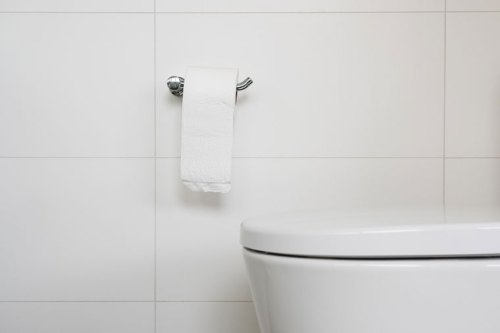Our editors independently select these products. Making a purchase through our links may earn Well+Good a commission
What your poo can tell you about your health
The shape, size, color, frequency, and smell of your bowel movements can indicate the status of your overall health. Two medical professionals explain how.

Get ready—we need to talk about something a bit, um, off-color right now. “Poop!” says Parsley Health nutritionist Adrienne Dowd, with enough enthusiasm to warrant an exclamation point. “It’s something we all do and yet we don’t talk about it as much as we should.” (Or at all for that matter.) You may be totally content to stay mum on the topic, but your bowel movements can tell you a lot about your overall health. “Think back to the last time you visited your doctor,” says Dowd. “Did they ask about your bowel habits—frequency, shape, consistency? They should have.”
It’s important to know what “normal” looks like and to compare yours accordingly on a regular basis.
Unless you suffer from gastrointestinal issues (such as irritable bowel syndrome or Crohn’s disease), you may not give what’s going on in the bowl a second thought—or glance. However, it’s important to know what “normal” looks like and to compare yours accordingly on a regular basis. “An ideal stool should be a single, cohesive, and soft elimination,” explains Anish Sheth, MD, a gastroenterologist and author of What’s Your Poo Telling You?. “Some have described it as an S-shaped stool that nestles into the bottom of the toilet bowl.”
If this description has you worried about your output, rest assured that irregularity in the shape, size, or consistency doesn’t necessarily spell disaster. That’s because diet plays a huge part in the process and can affect the way everything, ahem, turns out on a day-to-day basis. Still, you can look to your stool for signs that all might not be quite right, whether the cause is simply nutritional in nature or not.
Keep reading for the most pressing stool-specific signs something might be off with your body—and what to do about them.

Infrequent movements
According to Dowd, you should be having a bowel movement one to three times per day. “For infrequent or pebble-like BMs, dehydration is most likely the culprit,” she says. “If you don’t have enough lube for your pipes, things are going to get stuck.” She advises drinking at least half your bodyweight in ounces of clean filtered water per day to help keep things moving.
Dowd also says that fewer than daily bowel movements can signify a lack of dietary fiber. “Most of us only get about 15 grams of fiber a day,” she explains. “That’s half of what we should be getting.” To remedy this, she suggests eating more vegetables, nuts, seeds, fruit, and whole grains as well as supplementing your diet with Psyllium husk, a source of soluble fiber derived from the seeds of the Plantago ovata herb.
Diminished size
According to Dr. Sheth, small stools can also be a sign that your diet lacks fiber. “Eating 25 grams of fiber daily and increasing your water consumption is a good first step” in getting back on track, he says. If this doesn’t normalize your stool, persistent small-sized movements can signify an intestinal blockage of some sort. “Progressively narrower or thinner stools can be a sign of rectal cancer blocking evacuation,” says Dr. Sheth, who advises you see a specialist if this is the case.
Floaters
This may come as a surprise to you, but your bowel movements aren’t supposed to bob at the top of the bowl. “While it’s not uncommon to have the occasional floater, consistently having floating BMs can be a sign of [nutrient] malabsorption and indicate a more serious condition,” says Dowd. “Taking digestive enzymes may help, but if you’re seeing floaters often, it would be good to check in with your doctor.”

Foul smell
“Very foul-smelling bowel movements may be caused by a diet high in low quality, processed foods,” says Dowd. “Ditch the takeout and eat whole foods in the form of organic vegetables, pasture-raised meats, and whole grains.” Dr. Sheth agrees that most short-term scent changes are likely related to what’s going into your body. “Foul aroma for a day or two is probably related to diet,” he says, noting that, more specifically, it can also result from food intolerances and even medications. In the former scenario, you might try an elimination diet—wherein you remove food groups from your diet one at a time and then reintroduce them back into your diet one at a time—to get to the root of the cause, while in the latter you are advised to seek your prescribing doctor’s advice.
Persistent changes in smell (accompanied by additional warning signs), however, are more concerning and may be a signal of a major health issue. “There is a characteristic smell of melena [a term used to describe jet-black, tarry stool] which is particularly pungent and signifies bleeding from the stomach,” notes Dr. Sheth. “Additionally, the infection called C. difficile colitis causes a very typical foul smell along with diarrhea.” An intensely pungent aroma can also indicate the presence of a parasite. A digestive checkup—often performed by a holistic doctor or functional medicine professional—can test for this. Some health conditions can even cause sweet-smelling poop. Bottom line: See your doctor if you notice a consistently strong and abnormal smell following you out of the restroom.
Diarrhea
Don’t worry, a random loose stool isn’t cause for concern. Dowd describes diarrhea as “watery bowel movements more than three times per day for more than four weeks.” It can, says Dr. Sheth, be caused by a number of things including infection, medications, and diet intolerances, and is alarming if it continues for a period of time. Signs it’s time to see the doc: “Persistent diarrhea, especially with abdominal pain or bleeding,” he says. And be wary of consistent bouts at night. “Reoccurring nocturnal diarrhea is usually from an infection or inflammation such ulcerative colitis or Crohn’s disease,” notes Dr. Sheth.
If you’ve visited your doctor for the issue and no serious issue presents, try an elimination diet to identify any food intolerances at play. “Try eliminating dairy first,” Dr Sheth advises. “Also, reduce your caffeine intake and use probiotics to help replenish healthy gut bacteria.”
Blood
According to Dr. Sheth, blood in your stool can be a sign of a diverse range of issues, some serious and some less so including diverticulosis, hemorrhoids, polyps, colitis, and even cancer. He recommends seeing a specialist if you notice any trace of blood to find out the cause.
Only you know when your body is off. Take control by learning what your period could be saying about your health. P.S. Your nails are talking, too.
Sign Up for Our Daily Newsletter
Get all the latest in wellness, trends, food, fitness, beauty, and more delivered right to your inbox.
Got it, you've been added to our email list.










